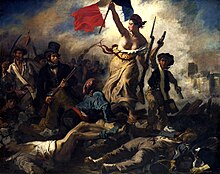| Revision as of 18:29, 22 June 2011 editRJHall (talk | contribs)Autopatrolled, Pending changes reviewers90,673 edits Clarify and cite the first sentence.← Previous edit | Revision as of 00:00, 23 June 2011 edit undoFifelfoo (talk | contribs)Extended confirmed users, Pending changes reviewers, Rollbackers13,796 edits Undid revision 435677709 by RJHall (talk) unreliable source: undergraduate textbookNext edit → | ||
| Line 4: | Line 4: | ||
| <!-- For administrator use only: {{Old AfD multi|page=Common people|date=20 June 2011|result='''keep'''}} --> | <!-- For administrator use only: {{Old AfD multi|page=Common people|date=20 June 2011|result='''keep'''}} --> | ||
| <!-- End of AfD message, feel free to edit beyond this point --> | <!-- End of AfD message, feel free to edit beyond this point --> | ||
| {{ |
{{unreferenced|date=October 2009}} | ||
| {{cleanup-rewrite|date=May 2011}} | {{cleanup-rewrite|date=May 2011}} | ||
| {{rescue}} | {{rescue}} | ||
| Line 11: | Line 11: | ||
| [[Image:Eugène Delacroix - La liberté guidant le peuple.jpg|thumb| | [[Image:Eugène Delacroix - La liberté guidant le peuple.jpg|thumb| | ||
| The ] was in origin an uprising of the commoners against the nobility and the clergy ('']'' by ])]] | The ] was in origin an uprising of the commoners against the nobility and the clergy ('']'' by ])]] | ||
| '''Commoners''' are historically the bulk of the population who are neither members of the ] nor of the ]. They were the third of the ] in ], consisting of ]s and ]s. | |||
| With the rise of the ] during the ], an intermediate class of wealthy commoners developed, ultimately giving rise to the modern ]. | |||
| After the ], the ] and with ], the division in three estates, nobility, clergy and commoners, had become obsolete, and in ], society was now divided into ] on one hand, and the ] or '''the masses''' on the other. | After the ], the ] and with ], the division in three estates, nobility, clergy and commoners, had become obsolete, and in ], society was now divided into ] on one hand, and the ] or '''the masses''' on the other. | ||
| Line 33: | Line 34: | ||
| ==References== | ==References== | ||
| <references/> | |||
| {{reflist|refs= | |||
| <ref name=andersen_taylor2010>{{cite book | author=Andersen, Margaret L.; Taylor, Howard F. | title=Sociology: The Essentials | edition=6th | page=181 | publisher=Cengage Learning | year=2010 | isbn=0495812234 | url=http://books.google.com/books?id=xeKM5THSEKsC&pg=PA181 }}</ref> | |||
| }} | |||
| ] | ] | ||
Revision as of 00:00, 23 June 2011
| An editor has nominated this article for deletion. You are welcome to participate in the deletion discussion, which will decide whether or not to retain it.Feel free to improve the article, but do not remove this notice before the discussion is closed. For more information, see the guide to deletion. Find sources: "Commoner" – news · newspapers · books · scholar · JSTOR%5B%5BWikipedia%3AArticles+for+deletion%2FCommon+people%5D%5DAFD |
| This article does not cite any sources. Please help improve this article by adding citations to reliable sources. Unsourced material may be challenged and removed. Find sources: "Commoner" – news · newspapers · books · scholar · JSTOR (October 2009) (Learn how and when to remove this message) |
| This article may need to be rewritten to comply with Misplaced Pages's quality standards. You can help. The talk page may contain suggestions. (May 2011) |

Commoners are historically the bulk of the population who are neither members of the nobility nor of the clergy. They were the third of the Three Estates of the Realm in medieval Europe, consisting of peasants and artisans. With the rise of the bourgeoisie during the Late Middle Ages, an intermediate class of wealthy commoners developed, ultimately giving rise to the modern middle classes.
After the French Revolution, the Napoleonic wars and with industrialization, the division in three estates, nobility, clergy and commoners, had become obsolete, and in communist theory, society was now divided into capitalists on one hand, and the proletariat or the masses on the other. In Marxism, the people are considered to be the creator of history. By using the word "people", Marx did not gloss over the class differences, but united certain elements, capable of completing the revolution. The sympathy for the common people gained strength in 19th century in many countries. For example, in Imperial Russia a big part of the intelligentsia was striving for its emancipation. Several great writers (Nekrasov, Herzen, Tolstoy etc.) wrote about sufferings of the common people. Some organizations, parties and movements arose, proclaiming to the liberation of the people: "People's Reprisal", "People’s Will", and others in the 19th century, "Party of Popular Freedom", "People's Socialist Party" and others at the beginning of 20th century.
In The Code of Hammurabi punishments were harsher for harming a noble than a commoner.
See also
- Commoners in the United Kingdom
- British subject
- Bourgeoisie
- Hoi polloi
- Republicanism
- Deme
- Folk
- Ochlocracy
- Demagoguery
- Populism
- Tyranny of the majority
References
- Western Civilization: Ideas, Politics, and Society By Marvin Perry, Myrna Chase, Margaret C. Jacob, James R. Jacob, page 13